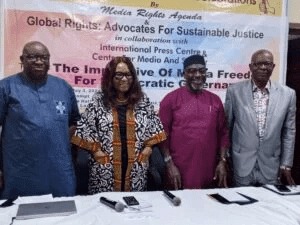
Stakeholders in the media industry, including journalists, lawyers and human rights defenders, have adopted the Lagos Plan of Action on Media Freedom in Nigeria endorsed during a hybrid event commemorating World Press Freedom Day 2024, which outlines a roadmap and actions to improve the environment for journalism practice and media freedom in the country.
The one-day event which explored the theme: “The Imperative of Media Freedom for Democratic Governance,” took place at the International Press Centre (IPC) Conference Hall in Lagos and was organized by Media Rights Agenda (MRA) and Global Rights: Advocates for Sustainable Justice, in collaboration with IPC and the Centre for Media and Society (CEMESO). It brought together media proprietors, publishers, academics, human rights defenders, and representatives from various civil society organizations, lawyers, and other professionals.
The gathering was used to assess the current state of media freedom in Nigeria as well as discuss strategies to enhance the media environment and address impunity for attacks against journalists and media organizations.
The event was moderated by Ms. Blessing Oladunjoye, Publisher of BONews. It was addressed at the opening by Mr. Edetaen Ojo, Executive Director of MRA; Mr. Lanre Arogundade, Executive Director of IPC; and Dr. Akin Akingbulu, Executive Director of CEMESO. They welcomed participants and presented findings from monitoring activities focused on attacks on journalists and the media over the last year.
It featured testimonies from journalists who have endured attacks, victimization, and abuse while carrying out their work.
Journalists who shared their stories at the event were: Mr. Clinton Umeh of the online news outlet, Journalists 101, based in Enugu; Ms Khadija Yahaya, a journalist with Arewa Radio in Kano; Ms. Charity Uwakwe, an online journalist with Famous Reporters, based in Umuahia, Abia State; Mr. Eniola Daniel, a reporter with The Guardian newspaper in Lagos; and Mr. Benedict Uwalaka, a photojournalist with the Daily Trust newspaper, who is also based in Lagos.
Dr. (Mrs.) Uzochukwu Israel, a Clinical Psychologist at the University of Lagos, gave a presentation on the “Potential Psychosocial Effects of Attacks on Journalists and their Management.” She discussed the mental and physical health implications of trauma and emphasized the importance of seeking professional help when necessary.
Following the discussions, the following recommendations and resolutions among others were adopted at the event:
• Media stakeholders must collaborate more effectively to combat attacks on media freedom in Nigeria. This includes solidarity among media professionals, civil society organizations, and enhanced information sharing to avoid duplicated efforts.
• Media stakeholders should develop tools and procedures for tracking, documenting, and disseminating information on attacks against journalists to ensure all incidents are reported and addressed.
• Media professional bodies and civil society organizations should engage media organizations to support and protect journalists through security training, equipment provision, and the adoption of security policies.
• Federal and State Governments, along with relevant agencies and media stakeholders, should conduct media literacy and public sensitization to highlight the media’s role and the importance of their safety, while educating the public on ethical standards and legal redress for grievances.
• In appropriate cases, media professional bodies and other civil society organizations should utilize national, regional, and international judicial mechanisms to ensure accountability for attacks on journalists.
• Media stakeholders resolved to establish an industry-wide legal assistance and litigation program to support journalists and media organizations, funded by stakeholders, to ensure perpetrators are held accountable and to challenge repressive media laws.
• Media stakeholders resolved to collaborate with other stakeholders to create a national mechanism for journalists’ safety, ensuring perpetrators of attacks are prosecuted.
• Media stakeholders resolved to work towards adopting policies and legislation to protect journalists and the media, aligning with regional and international standards.
Please visit https://bit.ly/3K915C7 to access the full Plan of Action, which details the observations on the state of press freedom in Nigeria along with recommendations, and resolutions.




